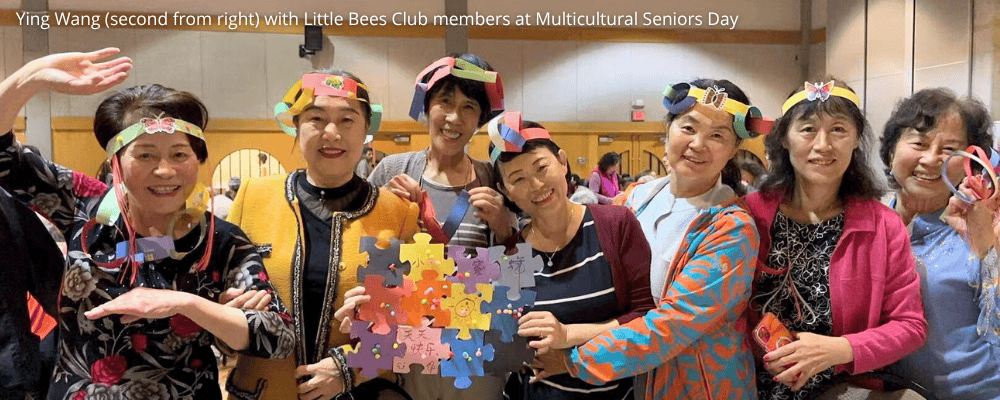A World Elder Abuse Awareness Day Reflection featuring Daisy Au, Coordinator of MOSAIC Seniors Club & Chinese Community Response Network
Each year on June 15, World Elder Abuse Awareness Day (WEAAD) shines a light on the mistreatment of older adults and calls on communities around the world to speak up. This year’s theme—“Be Bold – Age with Attitude”—celebrates the resilience of seniors and the importance of creating space for their stories, leadership, and dignity.
At MOSAIC, we are proud to support programs that centre the voices of older immigrants, many of whom have overcome systemic barriers and social isolation to find connection and confidence later in life.
Few understand this journey better than Daisy Au, who has worked in the immigrant settlement sector for over 20 years and currently serves as Coordinator of both the MOSAIC Seniors Club and the Chinese Community Response Network (CRN). For over 16 years, Daisy has walked alongside racialized seniors, helping them rebuild self-worth and speak up for themselves and others.
In this reflection, shared in her own words, Daisy offers a powerful look into the realities of elder abuse—and how community, connection, and intergenerational solidarity can help create lasting change.
I immigrated to Canada from Hong Kong and have worked in the immigrant settlement sector for over two decades. I’ve been part of MOSAIC’s Seniors Club for over 16 years, supporting immigrant and racialized seniors in building meaningful connections and reclaiming their confidence. I’m deeply motivated by a belief that every senior has a voice that matters—and that community can be a powerful place of healing and transformation.
To me, World Elder Abuse Awareness Day is a call to action. Elder abuse doesn’t always look like bruises—it can be neglect, financial control, or the emotional harm of ageism. Immigrant seniors are particularly vulnerable because of isolation, dependency, and language barriers. WEAAD matters because it helps break the silence and builds momentum for systemic change. It reminds us that older adults are not passive victims—they are powerful advocates, and we need to listen.
Over the years, I’ve heard painful stories—of seniors left alone in long-term care with no visitors, or caregivers who, after years of caring for grandchildren and supporting their families, are abruptly told to leave, with no legal rights or place to go. One senior was threatened by his daughter that he could not return to what was now ‘her’ house if he insisted on getting remarried. These aren’t isolated incidents—they reflect deeper systemic issues like ageism, invisibility, and the lack of legal or emotional protection for vulnerable seniors.
That’s why protecting seniors from abuse isn’t just about responding to crises—it’s about prevention, empowerment, and creating a culture that values older adults.
At MOSAIC, we’ve seen how programs like our musical theatre project, “Seniors Take On Things We Never Talk About,” give seniors the space to speak about the unspoken. When seniors reclaim their voices and share difficult truths, they not only begin their own healing journey—they also raise awareness and spark collective responsibility to protect those who may still be suffering in silence.
Community organizations like MOSAIC play a vital role in creating spaces where seniors feel safe, seen, and supported. At the Seniors Club, we don’t just run activities—we cultivate a culture of connection, leadership, and self-worth. Immigrant seniors, especially those facing language and cultural barriers, often arrive feeling invisible. Through peer-led programs, creative projects like musical theatre, and opportunities to take on leadership roles, they begin to reclaim their confidence and agency.
We don’t empower seniors—we create the space for them to empower themselves. The Immigrant Seniors Wellness Hub is one such example, where seniors support one another as walk-alongside companions. Their voices remind us that aging can be a time of growth and contribution. One participant, Sue, joined our Seniors Club Workshop and shared how it helped her shift her mindset. Living with a chronic health condition, Sue said she once struggled with feelings of loss and frustration—but through the workshop, she learned the power of reframing those moments. “I now have a strategy for those ‘I can’t do this anymore’ days. They have become ‘but I still can…’ days.” Her story is a testament to how knowledge, connection, and perspective can bring renewed strength in later life.
MOSAIC’s model is about walking alongside—not doing for. That distinction matters. It allows seniors to express their lived experiences, advocate for themselves and others, and know they are not alone. In doing so, they not only heal—they lead change in their communities.
If you suspect that a senior may be experiencing abuse, it’s important to proceed with care, respect, and patience. The instinct to “rescue” someone is natural, but we must remember that every older adult has the right to make their own choices—especially when there’s no immediate safety risk.
The It’s Not Right – Bystander Training* taught us to “be with them”—to break isolation, listen without judgment, and gently check in. Sometimes, that quiet companionship is what opens the door to trust. Don’t shut them down or pressure them into action. Instead, support their dignity by staying connected and respecting their pace.
When they are ready, they can contact the Seniors Abuse and Information Line (SAIL) at 1-866-437-1940 for confidential help and advice.
Every conversation matters. Sometimes, the most powerful thing we can do is simply walk beside someone until they’re ready to take the next step.
*The It’s Not Right – Bystander Training is a program designed to equip individuals with the skills to recognize and respond to situations of elder abuse and neglect, taught us to “be with them”—to break isolation, listen without judgment, and gently check in.
Younger generations have a vital role to play in challenging ageism and restoring the dignity of aging. Through intergenerational education, we create space for mutual learning, empathy, and connection. Our partnership with Stratford Hall School has shown how powerful it is when young people and seniors engage authentically—sharing stories, laughter, and insight across generations.
Respect starts with listening. When youth take time to understand the lived experiences of older adults, they begin to see aging not as decline, but as a source of wisdom, resilience, and imagination. One student told us that after spending time with our seniors, “It just felt like I was talking to my grandparents.” That sense of human connection is how we begin to shift the narrative.
Younger generations can contribute by being present, advocating for inclusion, and helping amplify seniors’ voices—not speaking for them, but standing with them.
I once heard a speaker say that ageism is the only form of discrimination we are all destined to face if we’re lucky enough to grow old. That thought has stayed with me. If we can truly recognize aging as a shared human journey—not a problem to fix but an experience to honour—we can begin to build a culture rooted in respect, dignity, and compassion across generations.




